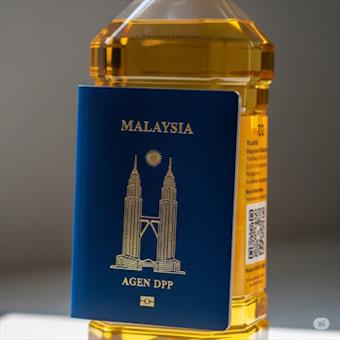 What is a Digital Product Passport (DPP)?
What is a Digital Product Passport (DPP)?

In recent years, the term Digital Product Passport (DPP) has been gaining attention across industries — from fashion and electronics to food and packaging. But what exactly is it, and why is it becoming so important?
Understanding the Digital Product Passport
A Digital Product Passport (DPP) is a digital record that contains essential information about a product throughout its lifecycle. Think of it as a digital “ID card” for products, making it easier to track, trace, and share details about origin, materials, manufacturing, usage, and end-of-life handling (such as recycling).
It’s part of the European Union’s Circular Economy Action Plan (CEAP) and a key initiative in moving industries toward sustainability, transparency, and responsible production.

Why is the DPP Important?
Transparency – Customers gain insight into how and where a product was made, its materials, and its sustainability footprint.
Compliance – Manufacturers and brands can meet upcoming EU regulations on sustainability and product data sharing.
Circular Economy – Facilitates reuse, repair, recycling, and responsible disposal of products by providing detailed material information.
Trust & Brand Value – Companies that adopt DPPs can build stronger trust with consumers by proving authenticity and responsible practices.
Innovation & Efficiency – Helps businesses streamline supply chain management and track product histories digitally.
How Does a Digital Product Passport Work?
Each product is linked to a unique identifier (such as a QR code, RFID tag, or NFC chip) that customers, businesses, and regulators can scan. Scanning reveals information stored in AGen digital system include:- Product origin and manufacturer details
- Materials and components used
- Repair instructions and spare parts availability
- Environmental impact and carbon footprint
- End-of-life recycling or disposal options
This ensures the information is accessible anytime, anywhere, by anyone with authorized access.
Industries Benefiting from DPPs
Fashion & Textiles – Showcasing supply chain transparency, sustainable materials, and care instructions.
Electronics – Tracking components, repairability, and recycling information.
Batteries & Energy Products – Providing lifecycle data, safety guidelines, and recycling requirements.
Food & Beverages – Ensuring traceability, authenticity, and sustainability of ingredients.
The Future of Digital Product Passports
The EU is expected to roll out DPP requirements gradually starting from 2026, with initial focus on industries like textiles, electronics, and batteries. Over time, this system may expand globally, reshaping how we buy, use, and recycle products.
By embracing DPPs, businesses can not only stay ahead of regulatory compliance but also gain competitive advantage by being transparent, sustainable, and customer-focused.
✅ Key takeaway: A Digital Product Passport is much more than a QR code — it’s a powerful tool driving sustainability, transparency, and trust in the global supply chain.
By:
pang
| Date:
22 Aug2025